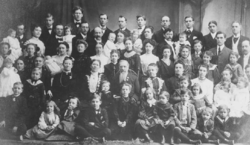- Morrill Anti-Bigamy Act
-
Mormonism and polygamy Background Prominent practitioners Related legislation - Morrill Anti-Bigamy Act
- Poland Act
- Edmunds Act
- Edmunds-Tucker Act
Related case law - Reynolds v. United States
- LDS Church v. United States
Related articles - Celestial marriage
- Spiritual wifery
- Polygamy in the United States
- History of civil marriage in the U.S.
- Freedom of religion in the U.S.
The Morrill Anti-Bigamy Act (37th United States Congress, Sess. 2., ch. 126, 12 Stat. 501) was a federal enactment of the United States Congress that was signed into law on July 8, 1862 by President Abraham Lincoln. Sponsored by Justin Smith Morrill of Vermont, the act banned bigamy and limited church and non-profit ownership in any territory of the United States to $50,000.[1]
The act was designed to target the Mormon practice of plural marriage and the property dominance of The Church of Jesus Christ of Latter-day Saints in the Utah Territory. The measure had no funds allocated for enforcement, and Lincoln chose not to enforce this law; instead Lincoln gave Brigham Young tacit permission to ignore the Morrill Act in exchange for not becoming involved with the Civil War.[2] General Patrick Edward Connor, commanding officer of the federal forces garrisoned at Fort Douglas, Utah beginning in 1862 was explicitly instructed not to confront the Mormons over this or any other issue.[2]
The Morrill Anti-Bigamy Act was amended in 1882 by the Edmunds Act, and then again in 1887 by the Edmunds–Tucker Act.
See also
- Mormon War (1838) (1838 Missouri)
- Illinois Mormon War (1844–1845)
- Mormon Exodus (1846–1857)
- Utah War (1857–1858)
- Poland Act (1874)
- Reynolds v. United States (1879)
- LDS Church v. United States (1890)
- 1890 Manifesto
- Smoot Hearings (1903–1907)
- Second Manifesto (1904)
- History of civil marriage in the U.S.
- Justin Smith Morrill
- George Reynolds
References
- ^ Statutes at Large, 37th Congress, 2nd Session, page 501. A Century of Lawmaking for a New Nation: US Congressional Documents and Debates, 1774 - 1875. The Library of Congress. Accessed 18 May 2006.
- ^ a b Firmage, Edwin Brown; Mangrum, Richard Collin (2001), Zion in the courts, University of Illinois Press, p. 139, ISBN 0252069803, http://books.google.com/?id=9AimifP2a-4C, "Having signed the Morrill Act, Lincoln reportedly compared the Mormon Church to a log he had encountered as a farmer that was "too hard to split, too wet to burn and too heavy to move, so we plow around it. That's what I intend to do with the Mormons. You go back and tell Brigham Young that if he will let me alone, I will let him alone.""
Categories:- 1862 in law
- 1862 in the United States
- History of The Church of Jesus Christ of Latter-day Saints
- Utah Territory
- Law related to Mormonism
- Legal history of the United States
- Mormonism and polygamy
- United States federal territory and statehood legislation
- 37th United States Congress
- 1862 in religion
- United States federal legislation stubs
- Utah stubs
- LDS stubs
Wikimedia Foundation. 2010.

